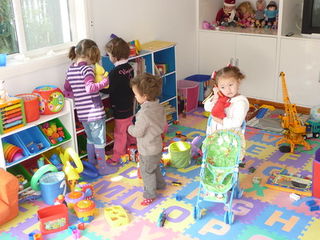Education
The Case for More Gentleness in Your Child’s Education
Here's an under-discussed criterion in picking your child’s school.
Posted February 8, 2020 Reviewed by Davia Sills

Of course, a case can be made for toughness: It's a tough world out there, and kids need to be prepared, both academically and personally. To compete in a global economy, learning standards need to be high, and we need to think twice about offering comfies such as "safe spaces," because they inhibit the ability to handle differences of opinion.
That said, especially readers of Psychology Today, who tend to have high aspirations for their kids, may overemphasize rigor over kinder, gentler factors. In an attempt to restore a measure of balance, I make the case here for gentleness in choosing schools for your children and in encouraging how they do school.
Preschool
These days, there's a press toward academic preschools and kindergartens: for example, Head Start. Yes, if your child is developmentally delayed, an argument can be made for starting pre-academics early, but in general, per David Elkind's The Power of Play, it's wise to choose a preschool that emphasizes exploration and minimally structured play.
K-8
Here again, choose a school that emphasizes developing the whole child, not just the academic brain. In addition, value a student body that seems kind. In some schools, even in early grades, competition is cutthroat, and there are too many bullies and exclusionary, even malevolent cliques.
As you peek into a prospective school's classes, do the kids seem contentedly engaged in active learning, individually and in groups? Or do many kids seem bored or even disruptive? During recess, is kindness the dominant tenor?
Usually, once or twice in a child's elementary school years, scuttlebutt and your observations suggest that a particular teacher is more focused on the whole child and otherwise is well-suited to your kid. For example, if you have a bright child, s/he'd benefit from a teacher who pays special attention to such kids. In such a year, the preceding spring, explain to the principal or school counselor why that teacher would be a much better fit for your child.
A moderate approach to homework is wise. I don't know of anyone whose life success or happiness much depended on whether they took a moderate rather than dogged approach to homework.
Extracurriculars should build on strengths. It pains me to see parents insist that Junior keep taking music lessons or playing a sport when talent and pleasure are conspicuously absent.
Another bugaboo is over-scheduling. Some of a child's happiest moments are in unstructured play, even, heaven forbid, daydreaming. Some of my happiest moments were lying on the grass, thinking while watching clouds scud by, and strolling the street, enjoying the beauty of trees and their fallen leaves and seed pods. And I didn't turn out to be a total failure.
High school
In addition to the kinder/gentler factor, here's where, in some schools, the pressure to get into prestigious colleges drives some kids to sacrifice their potentially wonderful high school years by loading up on Advanced Placement (college-level) classes, taking an SAT preparation course and studying for multiple retakes, and doing odious extracurriculars such as tuba playing or waking at 4 a.m. to freeze on the crew lake. And for what? Getting into a notch more selective college?
Sure, if it's a Harvard, Stanford, or MIT, the benefit of spending four years around the best-and-brightest plus a career-door-opening diploma may be worth it, although the stress and poor teaching at such research-centric rather than teaching-centric universities can be inordinate, depriving the student of a pleasurable and valuable college education.
Remember that genetics, parenting, peers, and neighborhood likely will have a bigger impact on your child's career and life success than getting into Stanford vs. Berkeley, let alone SUNY Binghamton vs. SUNY Geneseo, or NYU vs. Queens College. It's rarely worth sacrificing some of life's best years for that. Besides, parents shouldn't imply it's worth prostituting oneself for anything, let alone for USC vs UC Davis.
The takeaway
Life is hard enough and may grow harder still for your children in a global economy, a world in which the cost of a home will be unaffordable to most and a world in which anger about politics, race, class, and gender has accelerated to a level unthinkable even a decade ago.
Parents are wise to facilitate their child having a balanced school experience: yes, valuing academic achievement but perhaps more, the whole child's growth and, yes, pleasure.
I read this aloud on YouTube.




